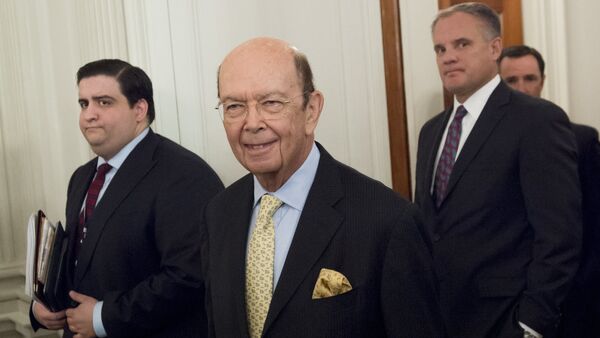Mr Ross told the American Chamber of Commerce in Sydney: “We do not love tariffs, in fact we would prefer not to use them, but after years of discussions and no action, tariffs are finally forcing China to pay attention to our concerns,”
He added that both countries "could have had a deal two-and-a-half years ago without going through the whole tit-for-tat that we have".
The most difficult problem to solve regarding trade with China was ensuring China adhered to agreement terms, Mr Ross told the Chamber of Commerce.
Wilbur Ross says China’s trade practices have become "more protectionist" https://t.co/cJvaKrVChb pic.twitter.com/wYb2BLNX1I
— Bloomberg Economics (@economics) October 10, 2019
“Trade agreements historically have been very weak on enforcement,” he said. “Given the magnitude and the complexity of the changes we need, enforcement becomes an extremely critical component of any agreement that we make.”
The news comes after US and Chinese officials planned to meet in Washington Thursday to Friday for negotiations, despite Washington increasing tariffs on $250bn in Chinese imports to 30 percent, up from 25 percent, by next Tuesday, angering Beijing.
Negotiations have failed to make progress during talks on Monday and Tuesday, according to the South China Morning Post. The US has repeatedly accused China of intellectual property theft and cybertheft, as well as demanding further access to Chinese markets to US companies.
The US Secretary of Commerce's visit to Australia comes a day after Forbes revealed that American authorities were trying to gain access to Australia's rare earth minerals market amid fears that China could potentially cut off supplies to US manufacturers, as indicated in an Australian Government report outlining its critical mineral's strategy.
US officials announced its strategy to secure critical minerals in June to ensure that Chinese retaliation against Washington would not result in crippling deficits in supply chains needed for American technologies, ranging from F35s to mobiles and computers.
The Federal strategy read: "The United States is heavily dependent on critical mineral imports. If China or Russia were to stop exports to the United States and its allies for a prolonged period – similar to China’s rare earths embargo1 in 2010—an extended supply disruption could cause significant shocks throughout U.S. and foreign critical mineral supply chains.
Trade tension have accelerated between Washington and Beijing after the latter said it would begin accelerating efforts to increase foreign investment after the White House mulled limiting US businesses in China, despite US officials previously stating that they wanted greater access to Chinese markets.
Beijing would encourage overseas financial institutions and capital flows to help boost China's domestic market, the Chinese State Council announced last week.
US authorities also blacklisted 28 additional Chinese companies days before the trade talks were set to take place, causing Beijing to "lower expectations for progress" in trade negotiations, Reuters reported. The news has also pushed markets downward, following disappointment amongst investors on the New York Stock Exchange.
But US president Donald Trump tweeted in early October that the US will keep a hardline stance on negotiations, stating that “we are winning and we will win," referencing the trade war.
US firms have been hit hard after stocks plummeted 800 points over two days from 2 October, strengthening fears over an imminent economic shutdown across the US. The news followed reports revealing the worst manufacturing figures published in a decade, as well as labour markets hiring fewer workers than in August, with the trade war and potential impeachment inquiry cited as other contributing factors, CNBC reported.



